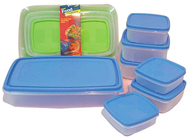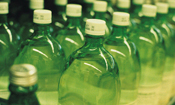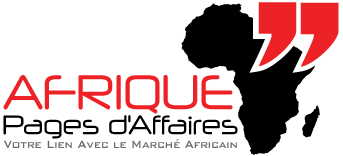>> Special Reports > The Plastics Industry in Africa
L'industrie des plastiques en Afrique
Africa has become a key player in the international plastics and packaging industry where plastic goods and expertise are in high demand. Africa's plastic industry is reporting high growth rates as demand for plastic goods and machinery in Africa registers a steady growth.
Africa's overall economy is currently on a growth path. Many countries in Africa have experienced several years of strong economic growth (ranging from 8-12% in 2012) and it is now  one of the fastest growing markets for plastic goods and machinery in the world. A growing economy, a population of over 680 million and the potential for significant long-term growth have made the African continent a priority market for many international companies. Some of the areas identified as opportun
ities for international companies include plastics production machinery (PME) as well as plastics material resins (PMR). Not to mention the high demand for plastic goods that has been growing throughout Africa.
one of the fastest growing markets for plastic goods and machinery in the world. A growing economy, a population of over 680 million and the potential for significant long-term growth have made the African continent a priority market for many international companies. Some of the areas identified as opportun
ities for international companies include plastics production machinery (PME) as well as plastics material resins (PMR). Not to mention the high demand for plastic goods that has been growing throughout Africa.
However, on the downside, Africa is not an easy place to do business. International companies complain of high levels of bureaucracy and corruption. The World Bank's Ease of Doing Business survey ranks most African countries quite poorly. Having said that, many entrepreuners often see an opportunity where others see hurdles.
As expected, the growing African economy is spurring growth in the continent's plastics industry.
According to industry reports, during the past six years the use of plastics in Africa has grown by an astounding 150%, at a compound average growth rate (CAGR) of approximately 8.7 per cent. Imports of  plastics into Africa have grown between 23% and 41% during this time. In a recent conference presentation, analysts predicted that the use of plastics in East Africa alone is expected to treble in the next five years. And there is potential for much more growth. Plastics consumption per capita in Kenya, for instance was just 10 kg in 2004 and it is expected to increase to 20 kg by 2015, which is still very low compared to many other countries in other parts of Africa.
plastics into Africa have grown between 23% and 41% during this time. In a recent conference presentation, analysts predicted that the use of plastics in East Africa alone is expected to treble in the next five years. And there is potential for much more growth. Plastics consumption per capita in Kenya, for instance was just 10 kg in 2004 and it is expected to increase to 20 kg by 2015, which is still very low compared to many other countries in other parts of Africa.
Although these predictions look rosy, there are challenges facing the Africa plastics industry. These include:
- domestic production being supplanted by imports;
- lagging behind developed countries in terms of production methods, product quality, scale of production and product range;
- the conservative attitude of manufacturers and consumers towards new materials;
- poor government support (and the strong position of the metals industry); and
- a shortage of good infrastructure to boost manufacturing.
Fast Facts About Africa's Plastic Market
KENYA
Demand for consumer plastic products has been growing at an average rate of 10-20% annually. Kenya's consumer spening has been spurred largely due to sweeping economic reforms that have led an overall economic development in many sectors and subsequently improved disposable incomes of the rising middle-class in Kenya. As a result, imports of plastic materials and resins in to Kenya has been registering a steady growth in the last two years. Analysts believe that in the coming years demand for plastic and packaging goods and machinery will further grow as Kenya's enterprising business community embarks on strengthening the country's manufacturing base by importing machinery and raw materials to set up manufacturing plants in Kenya to meet the rising demand for plastic and packaging solutions in East Africa.
Kenya's status as the regional business and distribution hub of Sub-Saharan Africa region will further help the country to boost its growing plastics and packaging industry.
Some notable players in the plastics and packaging industry in Kenya include:
- Dodhia Packaging Limited
- Statpack Industries Limited
- Uni-Plastics Ltd.
- East African Packaging Industries Limited (EAPI)
UGANDA
Being a landlocked country, Uganda imports a makority of its plastic and packaging requirements from regional and international suppliers and has emerged as a major importer of plastics in the East Africa region. Major imports include plastic moulded furniture, plastic house wares, woven sacks, bags, ropes,  plastic shoes, PVC pipes/fittings/electrical fittings, plumbing and drainage systems, plastic building materials, toothbrushes & plastics household products. Kampala, the business centre of Uganda, has become a centre for packaging industry as more and more manufacturing units are being set up in and around the city to meet the rising demand for plastic goods like melamine utensils, plastic household foods, plastic bags, toothbrushes etc. One of the largest players in the plastics industry in Uganda is Nice House of Plastics. Nice House of Plastics Limited was established in 1970 as a company manufacturing toothbrushes. Today the company is the leading manufacturer of plastic items, a wide range of writing instruments and toothbrushes in Uganda. Nice House of Plastics has a first-class, fully integrated production process using modern technology and machinery from Germany resulting in high quality and affordable products.
plastic shoes, PVC pipes/fittings/electrical fittings, plumbing and drainage systems, plastic building materials, toothbrushes & plastics household products. Kampala, the business centre of Uganda, has become a centre for packaging industry as more and more manufacturing units are being set up in and around the city to meet the rising demand for plastic goods like melamine utensils, plastic household foods, plastic bags, toothbrushes etc. One of the largest players in the plastics industry in Uganda is Nice House of Plastics. Nice House of Plastics Limited was established in 1970 as a company manufacturing toothbrushes. Today the company is the leading manufacturer of plastic items, a wide range of writing instruments and toothbrushes in Uganda. Nice House of Plastics has a first-class, fully integrated production process using modern technology and machinery from Germany resulting in high quality and affordable products.
Nice House of Plastics is part of the A.K. Plastics (U) Limited with its deep-rooted origins had a humble beginning with a single laundry soap production line installed in 1986. Today, close to just three decades later, it is a conglomerate of varied business interests ranging from manufacturing to transport and logistics to property development within Uganda and spanning across the Great Lakes region. Employing in excess of 7,000 individuals who share a common vision, A.K. Plastics (U) Limited delivers products and services at affordable prices to the people of the East Africa region and Sub Saharan Africa.
TANZANIA
In the East Africa region, one of the largest markets for plastics and packaging goods is Tanzania. The country has been importing plastic goods and machinery from al across the world in increasing quantities over the last five years and has emerged as a lucrative market for plastic goods in the region. Tanzania's plastic imports include plastics consumer items, writing instruments, rope & twines, plastics & metal spectacle frames, strainers, laminated & non laminated packaging material, bio-medical products, kitchenware, woven sacks & bags, pet preforms, gift & novelties & other plastic products.
ETHIOPIA
Ethiopia has also emerged as a major importer of plastic goods and machinery in recent times. Traders and wholesalers in Ethiopia have been imprting a wide variety of plastic goods and machinery including moulds for plastics, GI Pipes, Dies & Moulds for Plastic Films, Plastic Packaging material, Kitchen Plastic Products, Pipes & Fittings – to name a few. The sheer size of the market makes Ethiopia an attractive market in Africa for the plastics indusrty: Ethiopia is Africa's tenth largest country with a population of approximately 70 million people.
Ethiopia adopted a free market economic policy in 1992, and in line with this  has promoted private investment. As a result, the plastics industry in Ethiopia has been growing at a rapid pace as demand for plastic products in the local market has been registering a steady growth since 2005. Several foreign companies have been entering into joint-venture operations with Ethiopian partners to set up plastic manufacturing plants in Addis Ababa. Ethiopia has a reasonably good infrastructure by African standards and boasts of large pool of skilled labour. The cost of labour is very low in Ethiopia with a wage of US$1 a day for unskilled labor and average monthly salary of US$120 for a fresh graduate.
has promoted private investment. As a result, the plastics industry in Ethiopia has been growing at a rapid pace as demand for plastic products in the local market has been registering a steady growth since 2005. Several foreign companies have been entering into joint-venture operations with Ethiopian partners to set up plastic manufacturing plants in Addis Ababa. Ethiopia has a reasonably good infrastructure by African standards and boasts of large pool of skilled labour. The cost of labour is very low in Ethiopia with a wage of US$1 a day for unskilled labor and average monthly salary of US$120 for a fresh graduate.
Recently, an Indian and Mauritian joint venture in Ethiopia started production of fuel from waste plastics using new technology. The company has built a factory on 15,000 square meters in Akaki/Sebeta sub-city and the fuels, which can be produced from waste plastics, are being used for various applications including as jet fuel.
The company uses Indian scientist Professor Ms Alka Umesh Zadgaonkare’s innovation, which turns all plastic materials (PVC) into fuel within four hours of processing. From similar weight of waste plastics, the technology enables the company to produce the same/equivalent weight of fuel which can be used for various applications. Using this technology, India is saving foreign currency of approximately US$3.3 billion every year which it used to spend for importing fuel produced from crude oil.
With the objective of replicating India’s experience in other African countries, the joint venture is also on the way of installing fuel generating plants in Ghana and Mauritius. It is also negotiating with other countries such as Tunisia.
Such investment is believed to cut environmental pollution and cleans towns and cities like Addis Ababa free from plastic wastes such as plastic bags. It is also expected to encourage people who are engaged in dry waste cleaning services by giving them additional income from collecting these wastes and selling it to the company.
Plastic being non biodegradable, is accumulated in the environment and if not properly managed will lead to the creation of mountains of waste. Being highly detrimental to public health, causing high rates of pollution, making land inhabitable and contaminating the soil, which leads to soil degradation, are among the hazards caused by plastic waste.
More than 175 million tons of plastic is produced worldwide each year, but mechanisms are not designed for its proper disposal.
MOZAMBIQUE
Eversice Mozambique’s plastics factories were privatized in 1995 and 1996, there has been a flurry of activity in the sector. New manufacturing plants have been mushrooming around the country to meet the demand for plastic goods for the local and regional markets. With a huge domestic market, Mozambique is indeed an attractive market for plastics and packaging industry. Inexpensive plastic products of all kinds enjoy strong consumer demand in Mozambique and other regional markets. As a result, has emerged as a major importer of plastics production machinery (PME) as well as plastics material resins (PMR).
SOUTH AFRICA
Undoubtedly, South Africa is one of the biggest players in the African market when it comes to the plastics and packaging sector. The South African plastics market is currently valued at approximately US$3 billion – which includes raw materials and products. South Africa accounts for 0.7% of the world market and per capita consumption of plastic is about 22 kg. Another salient feature of the South African plastics sector is that around 13 per cent of original plastic is recycled annually, mostly recovered as post consumer waste. This represent around 30% of actual packaging polymers produced.
High demand for the conversion technologies like extruder, injection molding, blow molding, roto-molding and thermoforming. Demands for products include film, sheet, packaging material, kitchenware, furniture, pipes, footwear and industrial parts. Being a developed country, plastics recycling and environmentally friendly plastics are considered important for the plastics industry in South Africa.

Annoncez dans le magazine
Magazine en ligne
Télécharger Annuaires Afrique
Ajouter votre Profil de l'entreprise
-
 Arabian Jerusalem Company:
Arabian Jerusalem Company:
L'un des principaux fournisseurs de machines et de matériel de construction neufs et d'occasion. Les produits incluent des Grues, Jantes Chargeurs, Bulldozers, niveleuses, rouleaux compresseurs, Tractopelles JCB, Pelles, générateurs, compresseurs d'air, etc .. Bétonnières -
 Global Auto Parts:
Global Auto Parts:
Fournisseur de toute une gamme de pièces d'automobiles après-vente pour une grande variété de voitures. Recherche distributeurs et des agents en Afrique... -
 World Wide Auctioneers:
World Wide Auctioneers:
Auctioneers de machines neuves et d'occasion contruction, de machines industrielles, de transport et d'équipements lourds. World Wide Auctioneers est également l'agent pour Unic Grues et un nom de renommée mondiale dans le dépôt de machines et d'équipements lourds ... -
 Hollywood Style Cosmetics:
Hollywood Style Cosmetics:
Gamme complète de produits cosmétiques qui sont extrêmement populaires auprès des acheteurs africains. La société offre des promotions pour les clients africains et la recherche de distributeurs en Afrique... -
 Solite Batteries:
Solite Batteries:
Batteries Solite gagnent en popularité dans les marchés africains en raison de leur longue durée de vie et des prix compétitifs. Contactez directement les concessionnaires et économiser de l'argent
-
 Marchands de pneus à Dubaï
Marchands de pneus à Dubaï
Contactez-exportateurs à Dubaï spécialisée dans les pneus, les tubes et les batteries. Offres spéciales pour les acheteurs africains offerts... -
 Le marché des pneus en Afrique
Le marché des pneus en Afrique
Importateurs en Afrique sont à la recherche de nouvelles sources d'approvisionnement pour répondre à la demande croissante de pneus dans les marchés africains ... -
 Trouver des partenaires commerciaux en Afrique
Trouver des partenaires commerciaux en Afrique
Lignes directrices sur la façon de trouver des partenaires commerciaux, des agents, des distributeurs sur les marchés africains... -
 Répertoire des entreprises Nigeria
Répertoire des entreprises Nigeria
Télécharger le Répertoire des entreprises Nigeria en format Excel. Liste des entreprises au Nigeria sous différentes catégories commerciales...
-
Stay up to date

- Abonnez-vous au flux RSS





Exporters in Dubai